How Much Does a Domain Name Cost in 2024 + Can I Get One for Free
A domain name is essential for building a strong online presence. Fortunately, registering one does not have to be expensive.
The average domain name cost is around $10-20/year. That said, domain name prices vary depending on factors such as the chosen registrar, registration period, and additional features.
This article will explore factors influencing domain registration fees and the steps to buy a domain. We will also cover the cost of redeeming an expired domain name and how to get one for free.

Factors That Influence the Domain Name Cost
At Hostinger, a domain name with a popular extension like .com or .net usually costs between $4.99-9.99/year. We also offer low-cost domains starting at $0.99/year, and, for existing customers, Domain Bundle offers that include the same domain name with three different extensions at a great price.
Let’s explore the six factors affecting these prices. Keep in mind that we’re only focusing on non-premium custom domains, which are readily available to register on domain registrars like Hostinger.
1. Domain Registrar Fees
Different domain registrars have their own pricing policies. Some registrars offer significant discounts on first-year registrations to help people get online, while others have fixed plans with a higher starting price.
Reduce your expenses by getting a hosting plan that features a free domain name. Hostinger’s regular hosting and cloud web hosting plans offer this perk, saving you on first-year domain fees and streamlining all website elements on one platform.
Remember to get your domain name from an ICANN-accredited registrar to ensure credibility. You can find Hostinger in ICANN’s List of Accredited Registrars.
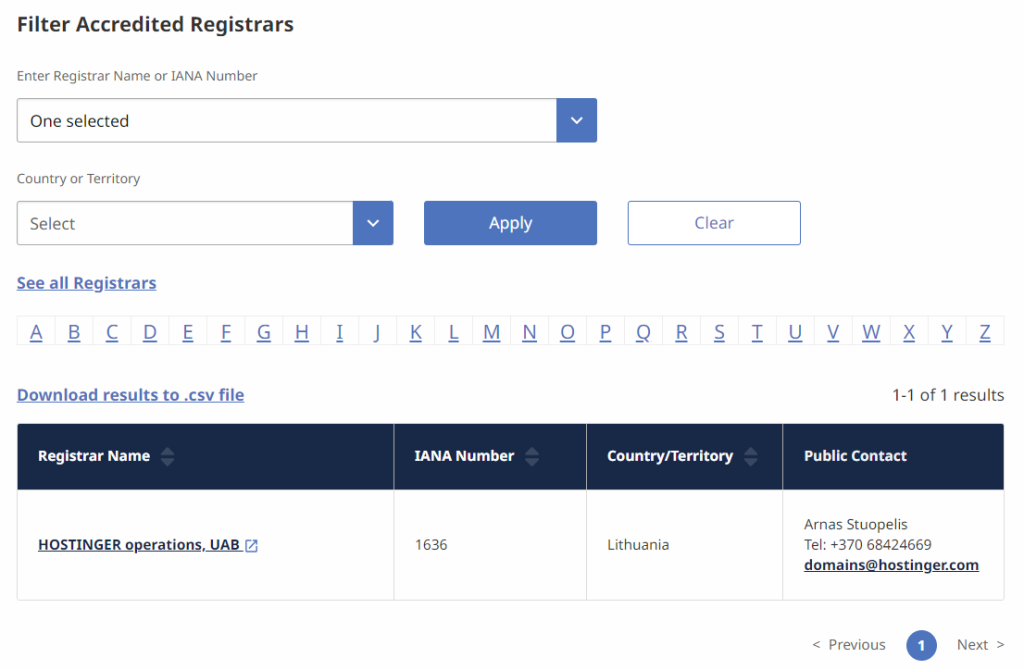
2. Top-Level Domain Pricing
Top-level domains (TLDs), or domain extensions, refer to the last part of a domain name. For example, google.com has Google as the address and .com as the domain extension.
There are three popular types of TLDs:
- Generic ‒ available for anyone without any geographical restrictions. .com, .net, .org, .shop, and .tech are common examples of this type of TLD.
- Sponsored ‒ since they belong to a certain entity, only eligible users can register sponsored TLDs. For example, .gov is the official extension for US-based government agencies, while educational institutions reserve .edu.
- Country-code ‒ TLDs like .us, .uk, .in, .fr, and .jp represent specific regions. Users need a registered address to buy one.
Popular extensions like .com are generally more expensive across most registrars. For those not needing a specific TLD, newer domain extensions like .xyz, .cloud, and .pro are often available at lower prices for the first year.
Besides registration fees, your preferred domain extension can influence renewal and transfer costs. Do your research before committing to a long-term registration period to avoid costly recurring payments.
3. Domain Privacy Protection
When registering a domain, WHOIS stores your personal details like phone number, home address, domain name, IP address, and expiration date. As the information is public, your site will be vulnerable to identity theft, email phishing, and spam.
Domain privacy protection keeps your data hidden in the WHOIS directory, making it a vital feature to get when buying a domain. It typically costs up to $15/year, but you can get it for free with Hostinger’s hosting plans and eligible domains.

Here’s how to activate domain privacy protection at Hostinger:
- Access Domains from hPanel.
- Click Manage next to your domain name.
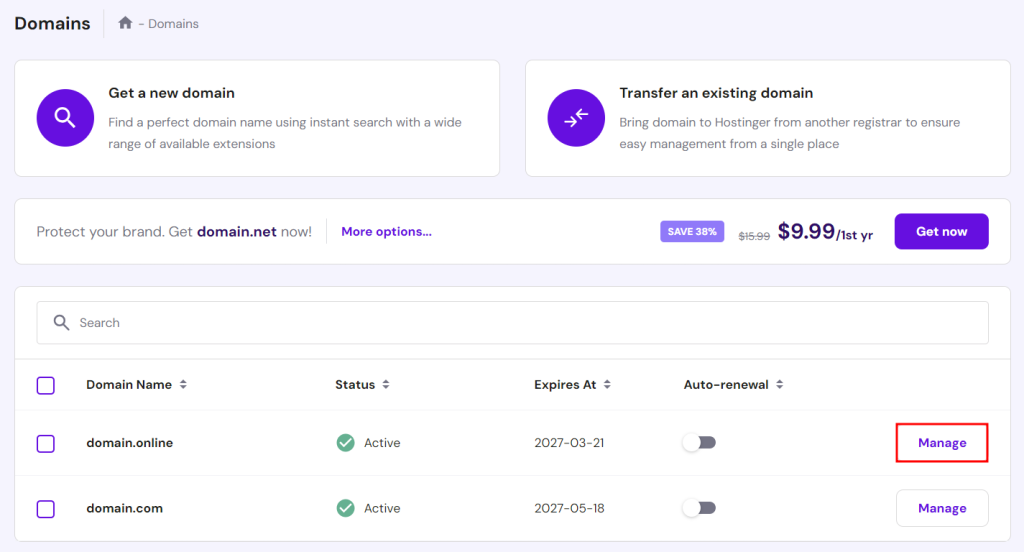
- Toggle on the Protect your privacy option.
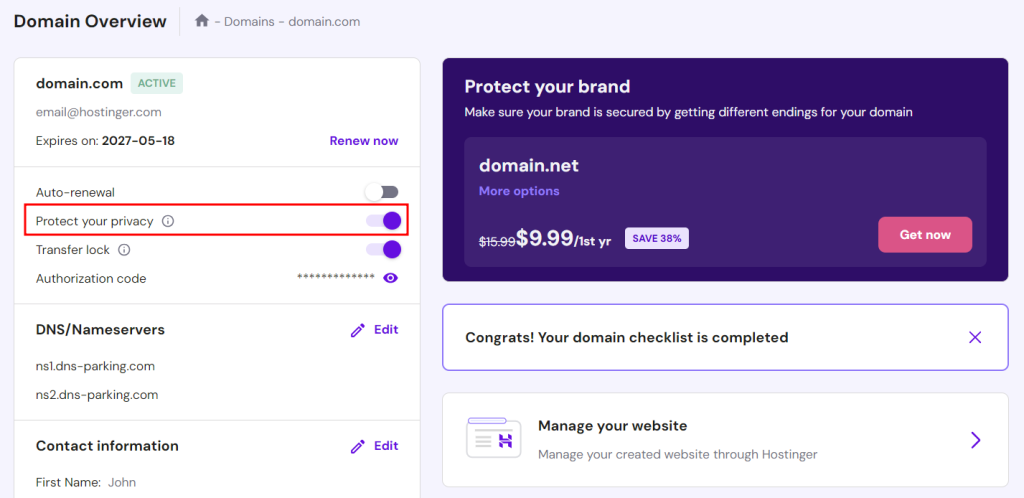
Run your domain name through the WHOIS domain lookup to ensure your contact details aren’t public.
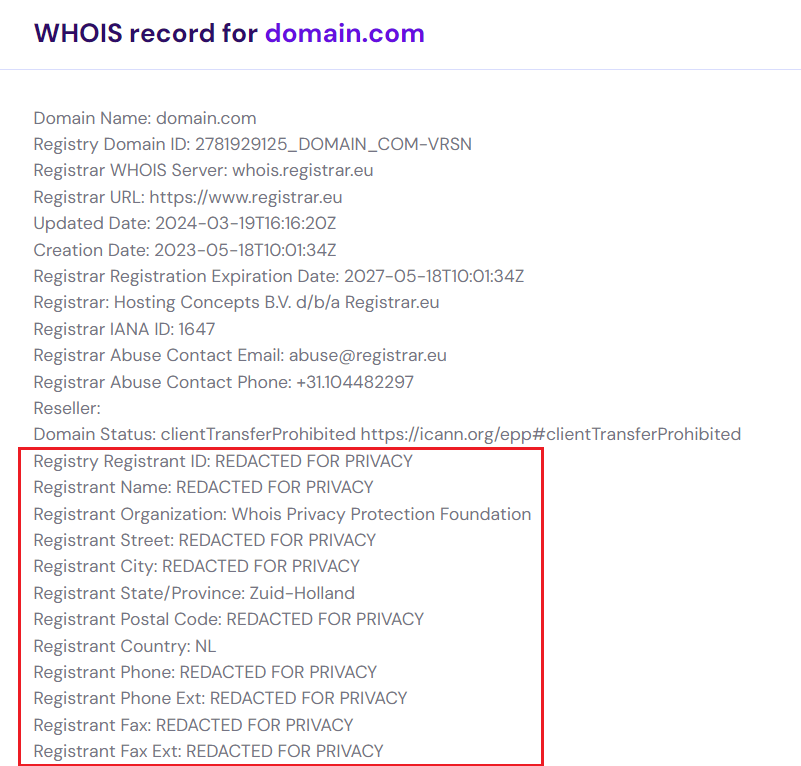
Keep in mind that certain domain extensions, such as .us and .uk, have privacy protection limitations due to regional regulations or registry policies. EU citizens also have their personal data redacted for all TLDs by default, thanks to the General Data Protection Regulation (GDPR).
4. Domain Registration Duration
Most domain registrars offer a minimum registration period of one year. However, a longer duration often comes with discounts and protects you from yearly price hikes.
For example, Hostinger gives a 69% discount for the first year when you register a .com domain for two years. Discounts vary based on the TLDs.
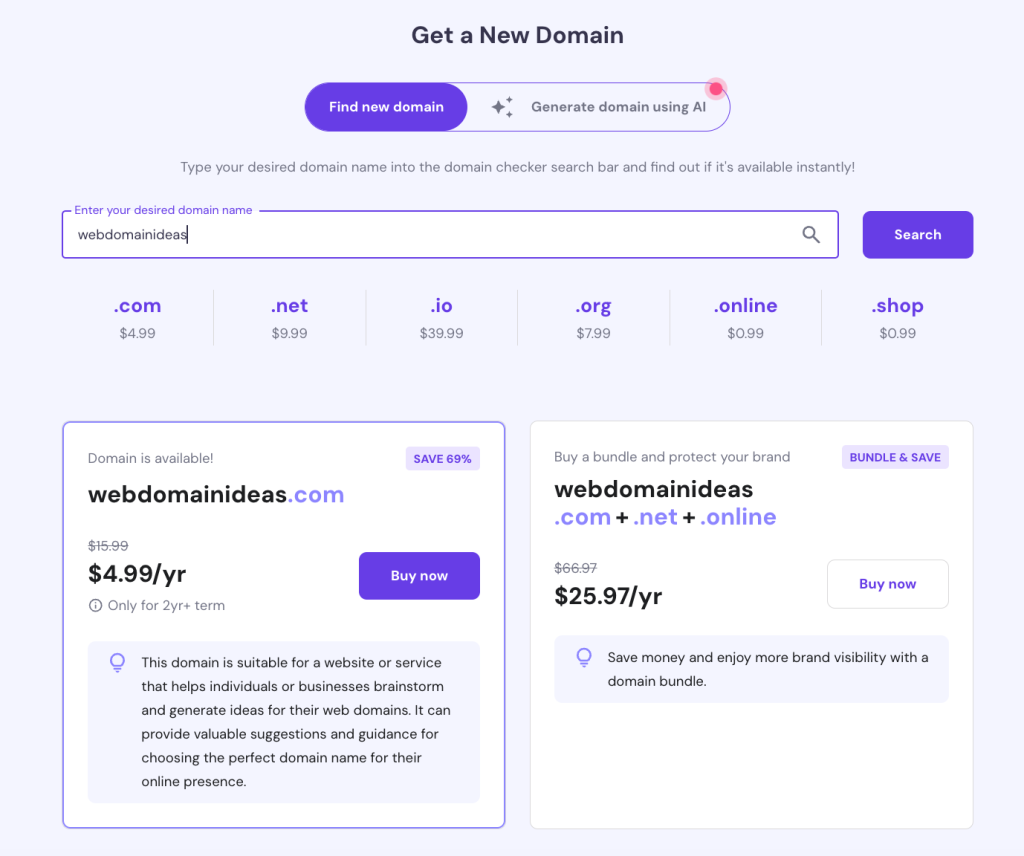
5. Domain Transfer Fees
Domain transfer refers to the process of migrating a domain name to another registrar, usually for better support, cheaper renewal pricing, and simpler management.
Before transferring a domain, compare the transfer fees and requirements as well as the renewal costs. Some providers offer free domain transfers but charge for setup and renewal for the first year. In some cases, the transfer fees are extremely low, but they don’t cover renewal costs.
We recommend opting for registrars that include domain renewal within their transfer fees.
Consider any additional services you need, such as WHOIS domain privacy and email services, as they can impact the overall cost.
6. Custom Email Accounts
A custom email address that represents your business name helps boost brand recognition. For instance, using name@yourdomain.com over name@gmail.com will make you appear more professional.
Creating a professional email account via a domain registrar or email service provider requires additional fees. Luckily, some web hosts like Hostinger bundle free custom email with hosting plans. Hostinger users can create up to 100 email addresses and forwarders for each hosting account at no extra cost.

How to Buy a Registered Domain Name
If your preferred domain is taken, you have two options to purchase it ‒ find the domain’s owner using WHOIS and make an offer or buy it from a domain marketplace like SnapNames.
Buying a registered domain is often more expensive than a new one, especially for premium domains. People purchase and sell them for anywhere from a few thousand dollars to tens of millions.
Two of the most expensive domains include lasvegas.com for $90 million and carinsurance.com for $49.7 million.
If you’re on a tight budget, consider using domain name generators to find alternative TLDs.
Let’s check petloverschronicle.com as an example. Since the name is unavailable, the domain search tool will suggest names with different TLDs, like petloverschronicle.net. With Hostinger, you also get AI-generated suggestions with modified keywords.
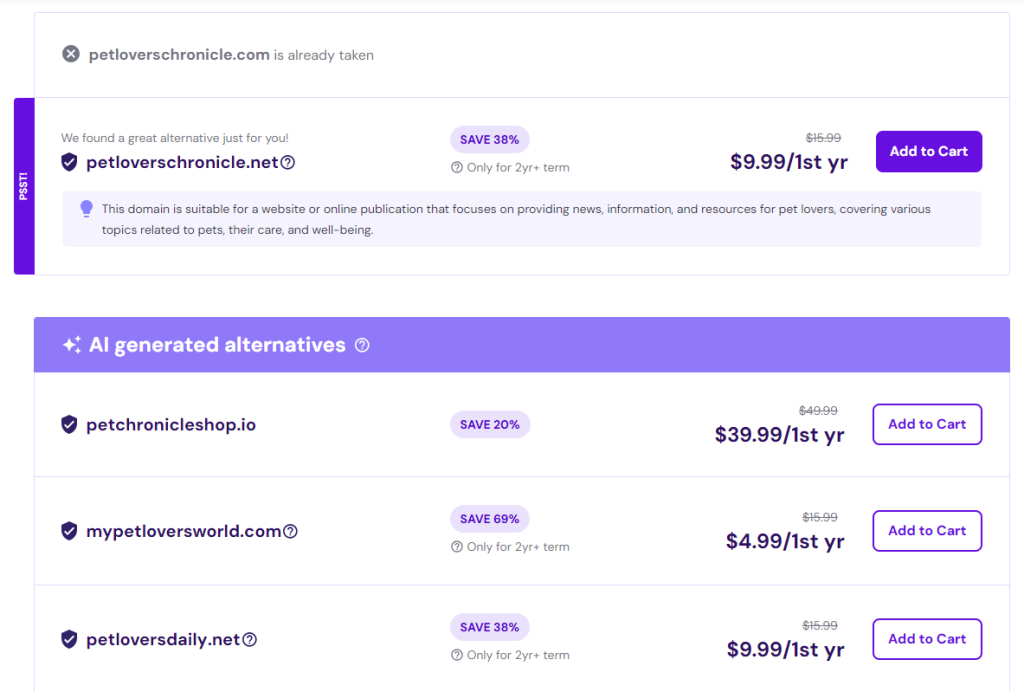
See our guide on choosing the right domain name for tips and the best registrars to buy from.
The Cost of Redeeming an Expired Domain Name
When a domain name expires, the owner might need to pay additional fees to redeem it. The amount depends on the domain name cycle and TLD.
The renewal grace period usually lasts 0 to 30 days after the expiration date for most generic domains. During this timeframe, a standard renewal fee applies.
Once the grace period ends, the domain will enter the redemption period, which lasts around 30 days, but the exact duration varies for different TLDs. If you fail to renew the domain name after the grace period ends, you’ll have to pay a redemption fee on top of the renewal cost to reclaim it.
Beyond that timeframe, the domain goes into pending delete status for about five days, where no one can make changes or redeem it. Once this period concludes, the domain goes back on sale for anyone to grab on a first-come, first-served basis.
Activate the auto-renewal feature to maintain continuous ownership over your domain. Hostinger users can Enable Auto-renewal for each registered domain from hPanel.
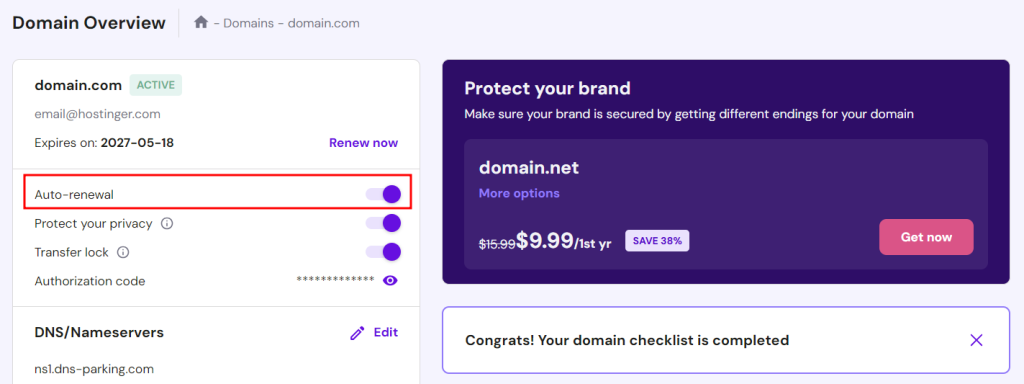
Keep your contact information updated to receive important reminders and notifications about your domain status.
How to Get a Free Domain Name
There are several ways to obtain a free domain name:
- From a web host that includes a free custom domain in the hosting plan.
- From a website builder providing free domain registration in its plan.
- From domain registrars that offer free domain registration for certain TLDs.
- Using a subdomain of another platform’s domain, such as yourdomain.wordpress.com.
- A premium email client with free domain registration in its plan.
- Joining an affiliate marketing program that offers a discounted or free custom domain.
Explore the detailed tutorial on how to register a domain for free.
While free lifetime domains may sound tempting, they come with security risks due to limited security features and support. Free low-quality domains also make your site seem unprofessional and untrustworthy, hurting your brand reputation.
Instead, choose the best method based on your needs. For example, users wanting to build a website can opt for a hosting or website builder plan that comes with a custom domain. If you need a domain for a business email, get it from a chosen email hosting provider.
Why You Should Register Multiple Domains
While you can launch a website with just one domain, opting in for the Domain Bundle offer and registering multiple domains helps protect your brand identity. By claiming domain names and TLDs similar to your main one, you reduce the risk of cybersquatting and phishing attacks.
For example, Hostinger has hostinger.com as our main web address. However, we also claim our name with other ccTLDs like hostinger.in and hostinger.fr to cater to users in specific regions.
This practice also lets you capture common misspellings or alternative spellings of your main domain, so you don’t miss out on potential traffic. Let’s say you have business.com ‒ owning busines.com helps capture visitors who might miss a letter.
Additionally, multiple domains are useful for promotional or seasonal campaigns and testing new business ideas. See it as an investment for expanding your online presence and protecting your brand.
Conclusion
A good domain name strengthens your website and business branding. Luckily, various great domains are available at different prices, making it possible for even those on a budget to get one.
Let’s recap the six factors that influence domain name pricing:
- Domain registrar fees.
- Top-level domain pricing.
- Domain privacy protection.
- Domain registration duration.
- Domain transfer fees.
- Custom email accounts.
We hope this article helped you plan the budget for the right domain name. If you have any questions, check out our FAQ section or leave a comment below. Happy domain shopping!
Domain Name Cost FAQ
This section will answer some of the most common questions about domain name prices.
Can I Buy a Domain Name for a One-Time Fee?
No, you can’t register a domain name permanently. Many domain registrars offer domain registration for up to 10 years at a time, but you can keep renewing it to maintain ownership.
Are There Any Hidden Costs Associated With Owning a Domain Name?
Yes, owning a domain can incur extra costs like renewal fees, privacy protection services, and premium features. The total amount varies depending on the registrar and domain type.
Why Do Domain Names Cost Money?
Domain names cost money to cover administrative and technical costs, such as managing databases and servers. The registrar’s features also influence your domain’s cost.
Can I Negotiate the Price of a Domain Name?
You can only negotiate a domain’s price if you buy it directly from its owner. Domain registrars offer fixed prices for TLDs and add-ons such as domain privacy.



Comments
December 28 2021
Hi there! How much do you charge for a domain transfer? Thank you!
December 30 2021
Hi! The transfer price varies from TLD to TLD, but you can check the price of your domain on Domain Transfer Page at hostinger.com/transfer-domain or check with our Customer Success team.
October 15 2022
If I want to register a .net or .com domain for 5 years with Hostinger will I be expected to pay sum of : (1) $9.99 for the first year and (2) $13.99 per year for each of the 4 years?
October 21 2022
Hi, at the moment we offer .com domains for a maximum term of 3 years, hence the price for 3 years would be $37.97, afterwards, you would need to renew the domain for $13.99/year. You can check the pricing and register a domain on our Domain Checker tool ?
February 19 2023
Hello, I already have a domain name and I do not want to buy (or use the option from Hostinger) but host my website on Hostinger. Am I forced to use domain+email from hostinger?
April 18 2023
Hi, I have .co.uk domain name & my domain is going to expire soon. I would like to transfer & renew my domain name from fasthosts to hostinger. How much in total it will cost for 1 or 2 Or 3 years? Including transfer fees & VAT. Thanks
April 21 2023
Hello! The domain transfer itself is around £1, but it won't renew your domain, as for renewal, for one year, it's around £8.99. Check out .uk domains transfer procedure in this article. Also if you need any assistance, be sure to contact our live support for help.
May 29 2023
Hi, I have .tax domain name & my domain is going to expire soon. I would like to transfer & renew my domain name. How much in total it will cost for 1 or 2 Or 3 years? Including transfer fees . Thanks
June 02 2023
Hello there. We don't support .tax TLD here at Hostinger, thus you wouldn't be able to transfer it here. You can still host it here, however you will need to renew and manage it at original registrar.
June 06 2023
Hi, I'm looking to transfer my website from Weebly to another hosting group, also the domain name expires in August and I need to renew it. My question is what are the costs of me transferring my website and renewing my domain?? Thank you.
June 08 2023
Hello there. Migration at Hostinger is free of charge as long as you get a hosting plan. However, if you used Weebly builder we won't be able to migrate the website and you will need to re-create it. As for domains, transfer costs can be checked here. Majority of domains do get renewed for 1 year as well after the domain transfer.